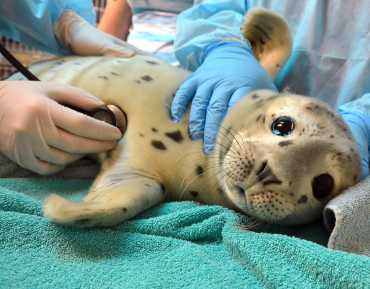
KQED: In Bay Area, Even Sea Otters Have Wearable Med
- Telemetry
- Species conservation
In Bay Area, Even Sea Otters Have Wearable Med
Published by KQED: September 13, 2017
On a recent Thursday, Otto skipped his $12 seafood breakfast to prepare for surgery. The 8-year-old southern sea otter was poisoned by exposure to toxic algae, likely after eating a batch of crabs. Toxic algae forms in warming ocean waters and produces a neurotoxin called domoic acid. This neurotoxin concentrates as it moves up the food chain, and it can cause seizures in marine animals and humans. During the winter of 2015 to 2016, domoic acid poisoning shut down the commercial crab season for more than four months.
Header image: photo by Bill Hunnewell © The Marine Mammal Center / USFWS permit MA101713-1
Yes, I want to save a life!

Yes, I want to save a life!
You’ll be giving sick and injured animals the best possible care at the Center’s state-of-the-art hospital. With your gift today, you are giving a patient a second chance at life in the wild.
See Our Latest News
{"image":"\/Animals\/Wild\/Gray whale\/cropped-images\/two-gray-whales-golden-gate-bridge-shutterstock-0-0-1270-992-1770234810.jpg","alt":"two gray whales under the Golden Gate Bridge","title":"The Marine Mammal Center and San Francisco Harbor Safety Committee Pilot New Vessel Operator Training Program","link_url":"https:\/\/www.marinemammalcenter.org\/news\/the-marine-mammal-center-and-san-francisco-harbor-safety-committee-pilot-new-vessel-operator-training-program","label":"Press Release","date":"2026-02-06 01:00:00"}

The Marine Mammal Center and San Francisco Harbor Safety Committee Pilot New Vessel Operator Training Program
February 6, 2026
Read More{"image":"\/Animals\/Wild\/Bottlenose dolphin\/cropped-images\/dolphinphoto-by-adam-li-c-noaa-0-0-1270-992-1769539954.jpg","alt":"A bottlenose dolphin jumps out of the water.","title":"What\u2019s the Difference Between Dolphins and Porpoises? And Other Animal Trivia","link_url":"https:\/\/www.marinemammalcenter.org\/news\/whats-the-difference-between-dolphins-and-porpoises-and-other-animal-trivia","label":"News Update","date":"2026-01-26 23:00:00"}

What’s the Difference Between Dolphins and Porpoises? And Other Animal Trivia
January 26, 2026
Read More{"image":"\/Animals\/Patients\/Sea otters\/2025\/cropped-images\/so-mooring-release-2-laurie-miller-c-the-marine-mammal-center-USFWS-permit-MA101713-1-147-8-1270-992-1770307740.jpg","alt":"Sea otter - Mooring","title":"Rescue Stories: Southern Sea Otter Mooring Named the 2025 Patient of the Year","link_url":"https:\/\/www.marinemammalcenter.org\/news\/rescue-stories-vote-for-your-favorite-marine-mammal-patient-of-2025","label":"News Update","date":"2026-01-16 10:05:08"}

Rescue Stories: Southern Sea Otter Mooring Named the 2025 Patient of the Year
January 16, 2026
Read More{"image":"\/People\/Action\/Veterinary care\/cropped-images\/Harris_Green turtle_TMMC-0-0-1270-992-1767649941.jpg","alt":"Heather Harris","title":"Seattle Aquarium Awards Dr. Heather Harris With Prestigious Conservation Research Award","link_url":"https:\/\/www.marinemammalcenter.org\/news\/seattle-aquarium-awards-dr-heather-harris-with-prestigious-conservation-research-award","label":"In the News","date":"2026-01-05 04:48:00"}

Seattle Aquarium Awards Dr. Heather Harris With Prestigious Conservation Research Award
January 5, 2026
Read More